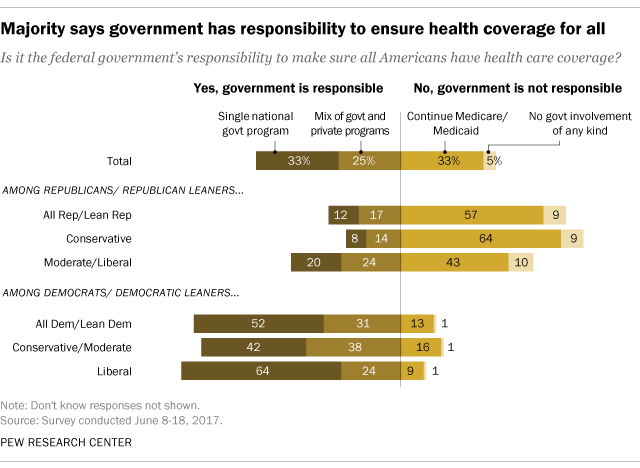Last month I attended a "Medicare for All" rally in Kansas City. The rally was hosted by a variety of groups, including the National Nurses United. Health care professionals at the rally spoke about how they believed our country was moving forward in discoveries in health, but backwards in the actual healthcare provided to people.
While Republicans attempted, and failed, last month to pass a bill which proposed a 33 billion tax cut for the very richest in America while allowing 22 million Americans to lose health insurance over the next decade, a new poll from Pew Research Center says that 1/3 of the US population is now in favor of single payer healthcare (healthcare for all).
[caption id="attachment_2154" align="aligncenter" width="640"]

Pew research Center on 2017.06.23 about "Public support for ‘single payer’ health coverage grows, driven by Democrats".[/caption]
The US already has a form of single payer health known as Medicare (health care for seniors and those with disabilities) which currently serves 57 million people out of the 320 million in the US. There’s no reason why expanding Medicare to the rest of the population is impossible, which is why single-payer health care advocates are calling for “Medicare for All,” or single payer health care.
Canadian Health Care
Canada currently has a single payer health care system, as does Scotland. Both countries have a life expectancy that is 2 years longer than the average American, and their health care system has cut the cost of health care substantially by removing the need for health insurance companies. According to the New England Journal of Medicine, 31% of total health spending is spent on administrative costs with insurance companies. A single payer health care plan for all Americans would save half of this administrative money, by completely cutting out the need for insurance companies, according to the non-profit research and education organization "Physicians for a National Health Program".
https://www.youtube.com/watch?v=1TPr3h-UDA0
Canadians spend half of what the US spends on health care, so their health care is organized around waiting lists. There is an online waiting list for the general public to find the medical facility where they will get the fastest treatment, however patients with life threatening issues do not wait in line and are found immediate healthcare.
Abolish Health Insurance Companies
"People are taking jobs based on health insurance, because health is a currency now. I want to live in a society where health care is a human right, not a privilege," a nurse at the Kansas City Medicare For All rally proclaimed.
According to the Alyson Hurt/NPR report that gathered data from the Institute for Health Metrics and Evaluation and the World Bank country classifications, currently, Americans have the highest cost per capita for health care among countries of similar life expectancy. According to the Kathleen Elkins report for CNBC.com, older Americans don’t retire as early as other countries because they are afraid of losing their health insurance, as they do not receive Medicare until the age of 65. In this way, not having Medicare for all and national health insurance policies for all people (including those below the age of 65) seems to make our country consider some people " worth saving," while others without insurance and money are not.
Finance
The way that doctors visits currently work is that clients with different forms of health insurance provide doctors with different levels of payment. According to a report by Peter Ubel to Forbes.com, doctors helping patients with Medicaid only receive 61% of what they charge from patients with Medicare,. Also, doctors helping patients with Medicare only make 80% of what doctors providing services to patients with private insurance providers receive (according to Tami Luhby's report on money.cnn.com).
In our competitive capitalistic economy, doctor’s offices can be deterred from taking lower income clients, because they will receive less money. This is an economic hierarchy in an industry that should be based on need and care.
https://www.youtube.com/watch?v=SkrVU5i26Ho
There will be new costs with Medicare for all, but there will also be new savings. For one, and according to Alanna Petroff's report on money.cnn.com, it's less expensive to run one health insurance program instead of the many America has going right now. In addition, doctors fees will go down because they will no longer need to fund the administrative cost of managing health insurance companies.
Current Efforts
Medicare is successful and popular in the US after 52 years in use, and Representative John Conyers from Michigan has proposed to expand Medicare for all with bill HR 676. The bill seeks to end the need for deductibles, copays, and eliminates the need for Medicare supplements. It will also cover vision, full dental and hearing (Medicare currently doesn't cover hearing aids).
At the rally in Kansas City, a nurse ended the rally with the proclamation,
"Things will work when we care about them. Let's start to inform ourselves about better options, and let's begin to care about where we're headed in the future."
 Pew research Center on 2017.06.23 about "Public support for ‘single payer’ health coverage grows, driven by Democrats".[/caption]
The US already has a form of single payer health known as Medicare (health care for seniors and those with disabilities) which currently serves 57 million people out of the 320 million in the US. There’s no reason why expanding Medicare to the rest of the population is impossible, which is why single-payer health care advocates are calling for “Medicare for All,” or single payer health care.
Pew research Center on 2017.06.23 about "Public support for ‘single payer’ health coverage grows, driven by Democrats".[/caption]
The US already has a form of single payer health known as Medicare (health care for seniors and those with disabilities) which currently serves 57 million people out of the 320 million in the US. There’s no reason why expanding Medicare to the rest of the population is impossible, which is why single-payer health care advocates are calling for “Medicare for All,” or single payer health care.

